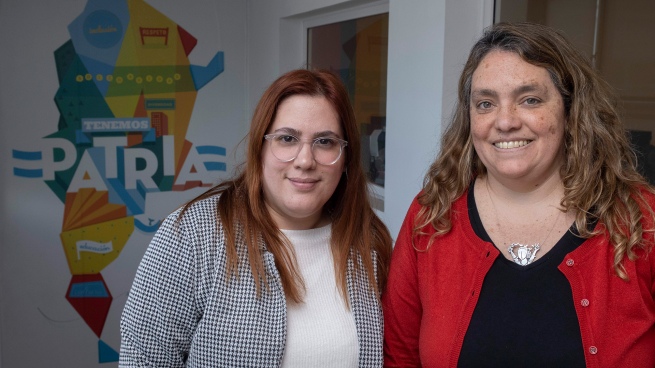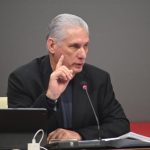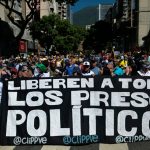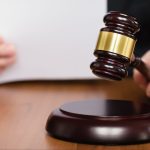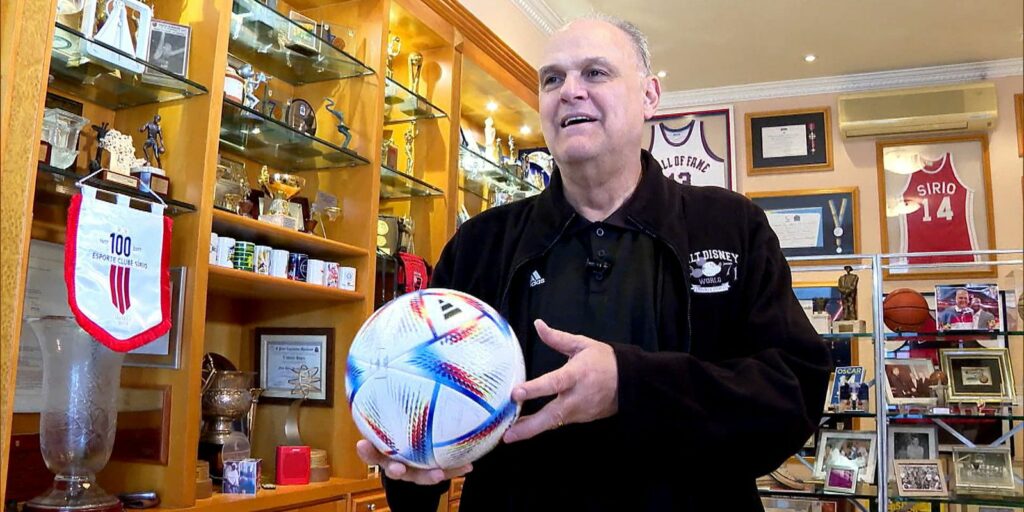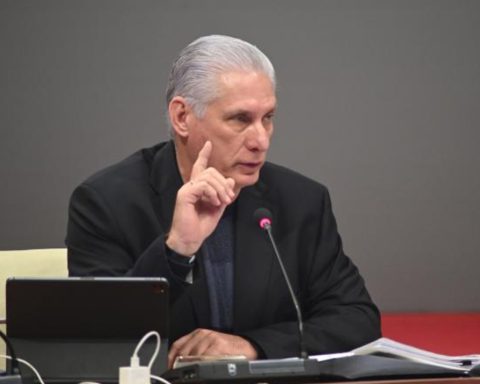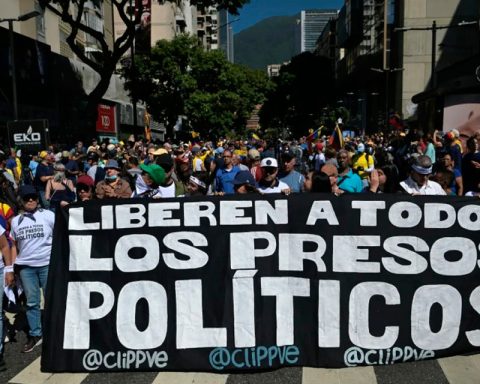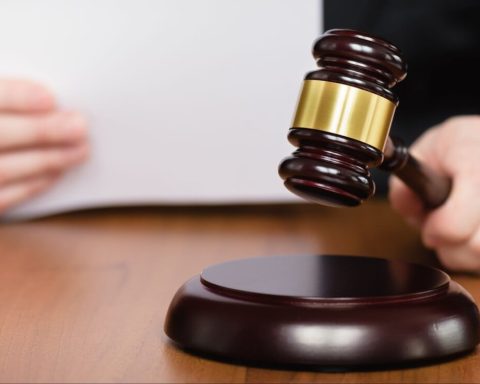Members of the digital content development team of the Educ.ar portal and the Connect equality platform pointed out that these State Education proposals constitute “a legitimate reference, with verified information and reliable sources” for teachers, who “appreciate the contribution of content of quality and accessible” throughout the country.
Within the framework of Teachers’ Day, the director of Educational Technology at Educ.ar and Conexión Igualdad, Laura Penacca, and the manager of Content and Training, Florencia Cornara, explained to Télam how content works, what criteria are in account and how the link between traditional education and platforms works in the teaching and learning processes.
– What characteristics do the contents that you select to develop on both platforms have?
– Florence Cornara: The contents must be open educational resources, that is, editable, downloadable and reusable. It organizes the school calendar for us, which is what schools are most looking for and what teachers need. We think of the portal, its networks and educational projects as a service, not as a repository of loose and lost content. Our most consumed content is the ephemeris, with peaks of up to 1.5 million monthly visits on the most important national dates. We have a presence on all social networks with thousands of followers, but the portal -Educ.ar- continues to be a page that has a very large organic flow of visits and unique users because it was the first educational portal in Argentina and became a legitimate reference where to go for content. Although our main audience is teachers, we also offer a selection of content for students and the community. In the portal there is content on Comprehensive Sexual Education (ESI), Social and Historical Sciences, activities, free software, technologies, tutorials, we offer more than 48 courses, many in alliance and articulation with other institutions such as INTA, Unicef, Wikimedia, for which we are going through the last cohort of the year, which will open in a few days, and we have more than 70 thousand people signed up.
-Laura Penaca: The criteria of the pedagogical proposals of Connect Equality focus on strong challenges that we have today in the compulsory system, because the effective graduation of secondary school students is something that must be addressed. The articulation between primary and secondary is also a challenge of the level, because in general during the basic cycle this transition is difficult, then it happens that the students begin to accumulate subjects that they take, that is why we take proposals for that transition. Finally, the proposal on pedagogical continuity has to do with strengthening and sustaining the trajectory because, although we always have to work to sustain it, after the pandemic with many students who did not return to school, the Ministry there had a strong policy to look for them and the idea is to strengthen those trajectories so that they stay and finish.

– How does the link between digital educational platforms and the traditional classroom space work? What aspects do they take into account?
– FC: We think of contents that aim to promote teaching in the framework of hybrid scenarios, and we consider that virtuality, digital and the inclusion of technology in teaching is not only fundamental, it guarantees and helps us to get closer to a quality education, but it is a right. We accompany this with training for teachers and with Connect Equality, meetings are held in all provinces and work is done in the territory in schools.
– What feedback do you have from the teachers in the territorial meetings of Connect Equality?
– LP: We have an excellent impact because there is a great need to be able to rethink the meanings of what we teach, there is a lot of uncertainty because the panorama is complex: teachers meet students who have been out of school for a long time, who they lost continuity with the pandemic, and also in itself, prior to this, there was a question with a subject from the cultural point of view that the teachers found and did not know how to summon them. Therefore, being able to have proposals that are built and armed with guidelines that invite them to think beyond the face-to-face class, beyond the presentation and explanation, which are very focused on production, they greatly appreciate it. The proposals have an interactive development, infographics, videos and all of this can be downloaded, exported to the virtual classrooms themselves, it is an important scaffolding for the task to be able to have all this material because production is also a task for the teachers when they rethink teaching and rethinking it implies that putting into play strategies that require development, that invite thinking, that put into discussion, that give multiple options. That the State makes available all kinds of high-quality materials is greatly appreciated. When we show it and discuss it with them they say: “This saves my life”. We present playful developments with modes and forms of contemporary culture, what students see and produce, such as the streaming format. This is very useful to question a cultural subject, who when he enters the school feels that he is transferred to another century.

– Are these platforms important for the democratization of content?
– FC: Yes, we at the Educ.ar portal provide a dissemination platform for all the materials of the Ministry of Education and its different directorates, with legitimate, verified information and reliable sources. And then make digital, multimedia and transmedia information available to both the educational community and the community in general. From the Educ.ar portal we pay at all times so that the contents are accessible to everyone, and we are about to launch a series of microcourses aimed at digital literacy, and in the first cohort of next year courses for the community that have to do with immersing oneself in the world and digital citizenship and learning to be digital citizens, because it is a subject that schools still cannot fully incorporate and it is essential to be a citizen in the 21st century to be a conscious and critical user of the Internet and of the platforms with a deep look that brings us closer to being able to think and reflect on the use. The contents of this management are designed with the logic of technological sovereignty and the right of everyone to have access to technology.

Educators highlighted the quality of Educ.ar content
Teachers from different educational levels highlighted the usefulness that the contents of the Educ.ar and Conexión Igualdad platforms contribute to their daily work in the classroom and highlighted the variety of topics addressed and the different approaches proposed.
“Many years ago I consulted the Educ.Ar platform because from there I get information, ideas and I can put together my classes in a more up-to-date way. After 30 years of service one needs to be updated, that’s why I use it frequently, I like it, it gives me approaches that I had not thoughtViviana Ojeda (55), a fourth-grade teacher at the 6,418 Rosario Vera Peñaloza school, in the Santa Fe town of Granadero Baigorria, told Télam.
Among the content topics that she used the most in the classroom, the teacher explained that she took ideas about Comprehensive Sex Education (ESI) and the information on “Fake News” and that it even conducted training courses through the platforms.
“We often analyze news that appears on television and we see that there is true news and false news that misinform instead of inform, so I look for an article related to that subject there,” he added.
Sebastian Perez (35) is a third-grade teacher at the 4 Provincia de La Pampa Primary School, located in the Villa General Miter neighborhood of Buenos Aires, and told this agency that the new productions that make visible the role of women in the processes of Revolution and Independence seemed “very useful” to him.
He also highlighted the scope and diversity of topics and that the productions are developed by teachers and referents of education.
“The platform is useful for assisting with work sequences in all grades. I use it occasionally, especially videos, sequences and pages,” he added.
Pérez pointed out that having this content provided by the State is “very important” so that pedagogical audiovisual content “is not regulated by the market” and pointed out that “sometimes there is a lack of devices to improve access or reproduction in schools, as well as certain access by teachers”.
She also recounted her experience with Educ.Ar María Isabel Grau (45), a History and Ethics and Citizenship teacher in the second, fourth and fifth year of the “Ernesto Che Guevara” Middle School 2, located in the Parque Avellaneda neighborhood of Buenos Aires.
“The platform has good didactic proposals, use of sources and videos. I use several sequences for the subject Ethical and Citizenship Training and also linked to history, to problems such as mega-mining, environmental struggles and the conquest of rights. It is good content quality and with a political-ideological perspective that I share, that’s why I use it”.
For his part, the teacher Rodolfo Oviedo (42), a History teacher and a graduate in Education of 4th, 5th and 6th grades of the secondary level at Secondary School 19 Juana Azurduy, located in the Buenos Aires town of Hurlingham, told Télam that the Educ.ar platform “widens the gaze” of teachers when preparing the activities that they carry out daily with the students; and highlighted the variety of texts, activities, testimonies, audios and videos.
“The times that I used the contents with the students I was able to obtain a great reception and, at the same time, great reflective participation”, he highlighted and concluded that “the Connect Equality program is a fundamental tool because the use of computers reinforces the importance of using of new technologies with the construction of knowledge”.
